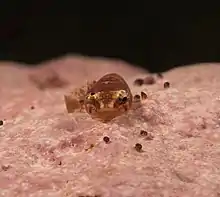| Modicus | |
|---|---|
 | |
| Modicus minimus | |
| Scientific classification | |
| Domain: | Eukaryota |
| Kingdom: | Animalia |
| Phylum: | Chordata |
| Class: | Actinopterygii |
| Order: | Gobiesociformes |
| Family: | Gobiesocidae |
| Subfamily: | Gobiesocinae |
| Genus: | Modicus Hardy, 1983 |
| Type species | |
| Modicus minimus Hardy, 1983[1] | |
Modicus is a genus of clingfishes endemic to the shores of New Zealand.
Characteristics
The genus Modicus is distinguished from closely related genera by the possession of well-developed gill rakers; rays in the pectoral fin; and by having their teeth clustered at the front of either jaw, each jaw having up to two well-developed canines with the lower jaw having a single row of backward curving teeth. There are gill filaments on the first 3 gill arches and the gill membranes are fused medially with the isthmus. The sucker is a double disc formed by the fused pelvic fins.[2]
Species
There are currently two recognized species in this genus:[3]
- Modicus minimus Hardy, 1983
- Modicus tangaroa Hardy, 1983
References
- ↑ Eschmeyer, William N.; Fricke, Ron & van der Laan, Richard (eds.). "Modicus". Catalog of Fishes. California Academy of Sciences. Retrieved 16 June 2019.
- ↑ Graham S. Hardy (1983). "A New Genus and Two New Species of Clingfishes (Gobiesocidae) from New Zealand". Copeia. 1983 (4): 863–868. doi:10.2307/1445087. JSTOR 1445087.
- ↑ Froese, Rainer and Pauly, Daniel, eds. (2012). Species of Modicus in FishBase. October 2012 version.
This article is issued from Wikipedia. The text is licensed under Creative Commons - Attribution - Sharealike. Additional terms may apply for the media files.